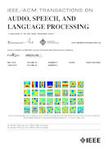版权所有:内蒙古大学图书馆 技术提供:维普资讯• 智图
内蒙古自治区呼和浩特市赛罕区大学西街235号 邮编: 010021

作者机构:ABB Corp Res N-1361 Billingstad Norway
出 版 物:《IEEE TRANSACTIONS ON SPEECH AND AUDIO PROCESSING》 (IEEE Trans Speech Audio Process)
年 卷 期:1994年第2卷第2期
页 面:266-273页
核心收录:
主 题:Predictive coding Speech coding Microphones Linear predictive coding Robustness Filters Costs Bit rate Vector quantization Performance gain
摘 要:A problem with speech coders based on trained quantizers is their lack of robustness against variations in the microphone and input filter response. In this paper a simple backward adaptive prefiltering technique is proposed as a means of improving the robustness and quality of a speech coder at no cost in bit rate. The technique is particularly useful in conjunction with vector quantization (VQ) of the linear predictive coding (LPC) parameters. The performance of the prefilter, denoted a microphone and speaker adaptation (MSA) filter, has been evaluated in terms of prediction gain and spectral distortion, together with objective and subjective quality of a 7.5 kbit/s CELP speech coder. In this coder a 10-bit direct VQ of the LPC parameters using the residual energy distortion measure has been applied. This is consistent with the covariance method of LPC analysis. Simulation results illustrate that the MSA filter significantly improves the performance and robustness of the LPC VQ against changes in the input response. The 7.5 kbit/s CELP with a trained excitation codebook and MSA was found to be clearly better (subjectively and objectively) than the one without MSA. The coder with MSA also showed to be practically indistinguishable from the same CELP with unquantized LPC coefficients and a stochastic excitation codebook.